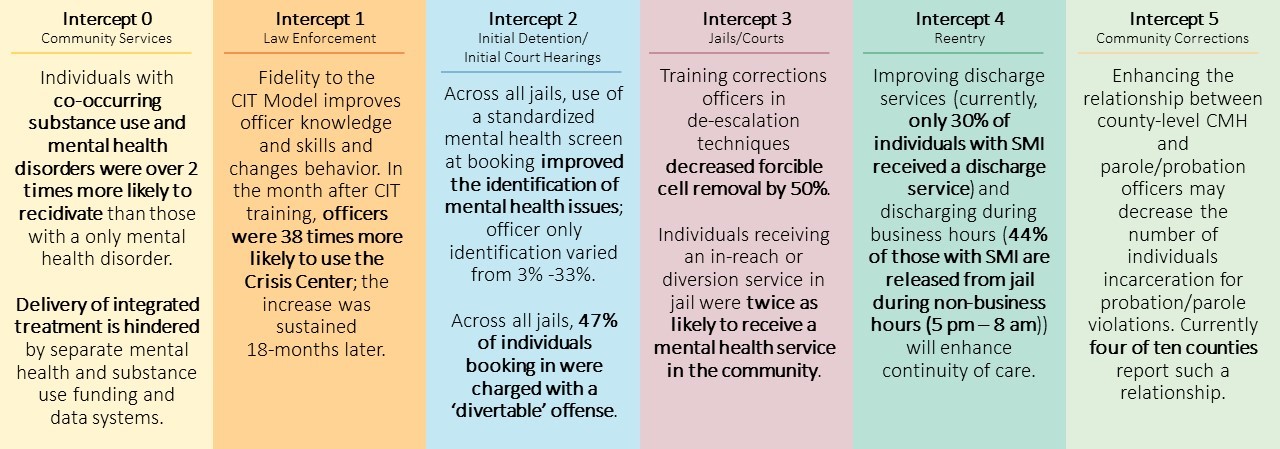Recommended Best Practices for Jail Diversion for Individuals with Mental Health Disorders
The Michigan Mental Health Diversion Council (MMHDC) was established in 2013 with the intent and focus of diverting individuals with mental health disorders and/or developmental disabilities from the criminal/legal system across the state. In 2014, the MMHDC, through the Michigan Department of Health and Human Services (MDHHS), sought proposals for interventions at one or more intercept points (e.g. Sequential Intercept Model1 (SIM)) to enhance diversion opportunities.

Between 2014 and 2017, ten counties were funded for pilot projects (Barry, Berrien, Kalamazoo, Kent, Livingston, Marquette, Monroe, Oakland, St. Joseph and Wayne Counties). Programs focused primarily on law enforcement training and jail services. Dr. Sheryl Kubiak (Wayne State University Center for Behavioral Health and Justice (WSU CBHJ)) and team lead an implementation and long-term outcome study of these pilot projects. In 2017, the MMHDC expanded support of these counties to bolster diversion efforts across all intercepts of the SIM. This expansion required an evaluation encompassing all intercepts, recognizing that individuals interact with multiple systems across the criminal/legal continuum. Using these two programmatic initiatives of the MMHDC and the evaluation research supporting them, specific practices at each intercept have been identified that empirically demonstrate improved outcomes, such as reducing recidivism or jail stays, increasing treatment access/continuum of care, and enhancing the knowledge and skills of officers.

While outcomes may vary across sites, all of the outcomes are achieved through best practices and align with the goals of the MMHDC. Based on the data and the practices of the pilot counties, the MMHDC and the WSU CBHJ have identified recommendations for state and county administrators that will support improved identification, referral and service delivery and decrease incarceration for those with serious mental illness and/or substance use disorders.
Recommended Best Practices for Jail Diversion for Individuals with Mental Health Disorders:
(Click each recommendation to view the brief)
- Valid screening for mental health and substance use disorderparticularly risk of withdrawalat jail intake that is consistent across the state,
- Use of 'boundary spanners' who can work across criminal/legal and treatment systems to facilitate both diversion from jail and optimal community re-entry,
- Increased training for law enforcement/corrections officers to enhance mental health knowledge and de-escalation skills, and
- Identify alternative locations for officers to divert individuals from jail.
While these best practices and outcomes pertain to adult systems of care, similar principles in the juvenile justice system are also supported by MMHDC.
References
-
Abreu, Dan, et al. "Revising the paradigm for jail diversion for people with mental and substance use disorders: Intercept 0." Behavioral sciences & the law 35.5-6 (2017): 380-395.
-
Center for Behavioral Health and Justice report, Mental Health Across the Criminal Legal Continuum: A Summary of Five Years of Research in Ten Counties (2019).